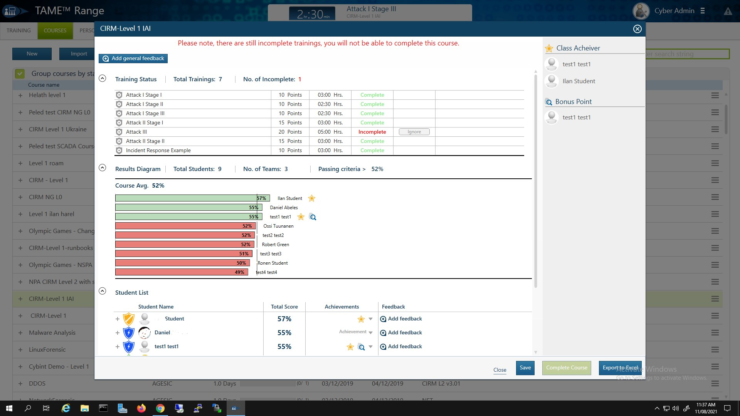
Tel Aviv: Israel Aerospace Industries (IAI) will give governments, academies, higher learning institutes and enterprises from around the world the opportunity to learn how to defend themselves from cyber threats through Microsoft’s Azure cloud computing service platform.
The TAME RANGE cyber training platform creates a realistic, interactive learning environment simulating real attacks, for training purposes. During the training, trainees’ performance and responses are monitored for feedback and improvement. The training platform also serves as infrastructure for experiments and a testing ground for new technologies and innovative concepts regarding resilience in the face of the ever growing and evolving cyber-attacks.
The collaboration with Microsoft will allow different organizations to make use of the training platform according to their needs and resources at any time and from any place, saving money and resources.
Israel is under Cyber-attacks all the time but is getting ready to a massive one , that might cause huge damages to its critical assets.
Sources say that most of the serious cyber-attacks come from Iran. The threat is real an imminent. A cyber-attack on Israeli infrastructure may include air traffic control installations. In recent years, Israel has been under a constant cyber-attack and the government has ordered the general security service to take every needed step to counter those attacks.
The National Cyber Defence Authority (NCDA) unit, which is responsible for protecting Israel’s national infrastructures against cyber-attacks, will assume protection of banks and mobile carriers. Israeli officials consider the cyber-attacks as an act of war and some were quoted saying that “an enemy should be treated like an enemy” . This means that the proper Israel organizations, will try and locate the source of the attacks, and make an effort to neutralize it.

Neutralize is a clean word for a major counterattack, either with cyber tools and when possible with more traditional weapons, short, long and very long range ones. As it looks now, this is an all-out war, and the concerns are high as signs prove that vital national installations are targeted almost daily.
The Israeli ATC system works very closely with this of the Israeli air force (IAF). Therefore any attempt to disrupt one of them will affect the other and may cause chaos with “very extreme scenarios”. So there must be a more comprehensive effort to mobilize all the assets that Israel has, to defend the Israeli vital systems including its ATC system from organized or sporadic cyber-attacks.
What is very clear is that many of the budget that were traditionally channelled to the deployment of advanced systems that are aimed at defending Israel from attacks either by missiles, rockets or enemy aircraft, are being rerouted now to the new cyber war.
The new agreement is part of this effort to make Israel better ready for cyber-attacks, a capability that has many potential customers around the world.








